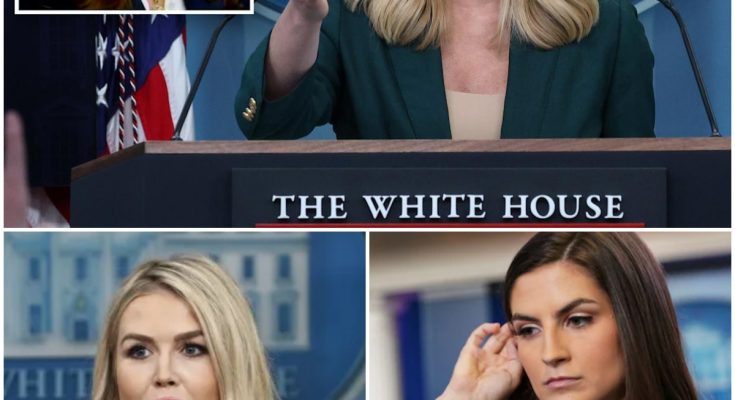Kaitlan Collins Questions Karoline Leavitt Over First Amendment Free Speech After Barring AP
In a tense and highly anticipated exchange, Kaitlan Collins, CNN’s chief White House correspondent, engaged in a sharp discussion with Karoline Leavitt, the Republican candidate for New Hampshire’s 1st Congressional District.
The topic at hand: Leavitt’s recent decision to block The Associated Press (AP) from attending one of her campaign events, a move that has ignited a fierce debate about press freedom, the First Amendment, and the boundaries of free speech.
The incident has raised critical questions about the relationship between public officials and the press, with Collins pushing Leavitt on her stance regarding free speech, press access, and accountability.
This confrontation comes at a time when the role of the media in holding politicians accountable is more scrutinized than ever. Collins’ direct questioning exposed the heart of the matter: can a politician, especially one running for office, justify barring a media outlet from covering their events? Does this decision undermine the public’s right to information?
The Controversy: Leavitt’s Decision to Block AP
The controversy unfolded after Karoline Leavitt’s campaign made the decision to exclude The Associated Press from attending a key event. Leavitt, a former White House communications director under President Donald Trump, is known for her strong conservative views, and her campaign has been characterized by a focus on championing conservative values and challenging the establishment media.
However, the decision to block the AP raised alarms, with critics arguing that such actions undermine the principle of a free press, which is enshrined in the First Amendment of the U.S. Constitution.
In response to the decision, Leavitt’s campaign defended the move, asserting that the AP had been unfairly critical of her campaign and had published biased coverage in the past.
Leavitt’s spokesperson, in a statement to the press, argued that “the Associated Press has consistently misrepresented Karoline Leavitt’s views and campaign priorities. As such, we have taken the step to bar them from attending this specific event to ensure a fair and unbiased representation of our campaign.”
However, critics quickly pointed out that blocking the press is a dangerous precedent. The First Amendment guarantees the right to freedom of speech and freedom of the press, protecting journalists from government interference.
When a candidate for office bars the media from covering their campaign, it raises questions about their commitment to these fundamental democratic principles.
Kaitlan Collins’ Sharp Questions
During an interview on CNN, Kaitlan Collins confronted Karoline Leavitt on her decision to bar the AP. Collins, who is known for her tough, direct questioning, did not shy away from probing the issue head-on.
With a clear focus on Leavitt’s actions, Collins pressed her on whether she thought her move violated the spirit of the First Amendment.

Leavitt responded by defending her right to curate her own media coverage. She argued that it was within her prerogative as a candidate to ensure that the media coverage of her campaign was fair and accurate.
“The press should hold us accountable, but we should also have the right to ensure that the coverage we receive is objective and unbiased,” Leavitt stated.
Collins quickly countered, pointing out that barring a major news outlet like the AP sends a troubling message. “Are you saying that it’s acceptable to block media outlets that you disagree with or who criticize you?” she asked.
Leavitt hesitated before responding, emphasizing her desire for fairness but also maintaining that her campaign had every right to exclude outlets they felt had been unfair.
The tension was palpable as Collins pressed further, noting that the press has historically played a vital role in holding public officials accountable.
“What does this say about your respect for the role of the media in a democratic society?” Collins challenged, echoing concerns from across the political spectrum about the erosion of trust in the media and the potential dangers of curbing press access.

The First Amendment and Free Speech
At the heart of this exchange lies a fundamental question about the balance between free speech and the media’s role in democracy. The First Amendment protects not only the right of individuals to express their opinions but also the right of the press to report the truth and hold public officials accountable.
Historically, the press has served as a watchdog, ensuring that government actions are transparent and that public officials are held to the highest standards of scrutiny.
Leavitt’s decision to block the AP has sparked concerns that politicians, especially those with significant political power, could use their influence to control the narrative and silence dissenting voices.
By barring a major news outlet from covering her event, Leavitt appeared to be making a statement about her own approach to media coverage—a statement that many critics have interpreted as hostile to the principles of a free press.

The First Amendment’s protection of press freedom has long been a cornerstone of American democracy, allowing journalists to investigate, report, and question public figures without fear of reprisal.
Any action that limits this freedom undermines the very foundations of democratic society and the public’s right to know.
Public Reaction and Media Outrage
Following the news that Karoline Leavitt had barred The Associated Press, there was widespread backlash from both journalists and political commentators.
Media organizations, including The Associated Press itself, condemned the decision, warning that it set a dangerous precedent for future campaigns and political discourse.
“The freedom of the press is not a privilege; it’s a right,” said AP’s spokesperson in a statement. “No politician, no matter their political affiliation, should be able to pick and choose which media outlets can cover their events. This is a direct attack on our ability to do our job as journalists.”
Many political analysts and commentators have voiced concerns that the move could alienate voters who value transparency and open communication between politicians and the public. The issue has also ignited a larger debate about the role of media in the political process and the increasing polarization of American politics.

Conclusion: A Crossroads for Free Speech and Democracy
The exchange between Kaitlan Collins and Karoline Leavitt highlights the ongoing struggle between free speech, media access, and the rights of politicians to control their public image.
While it is not uncommon for campaigns to seek favorable media coverage, barring a major news outlet from attending an event raises significant concerns about the limits of press freedom.
As the controversy continues to unfold, it remains to be seen whether Leavitt’s decision will have lasting repercussions for her political career. However, one thing is clear: the First Amendment and the right to free press are fundamental to the functioning of American democracy, and any attack on these rights is a matter of national concern.
This clash between Leavitt’s campaign and the press serves as a reminder of the delicate balance between freedom of expression and the responsibilities that come with holding public office.
The consequences of undermining this balance could extend far beyond the walls of a campaign event, affecting the very fabric of American democracy itself.




